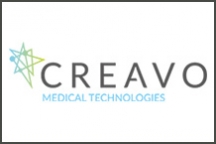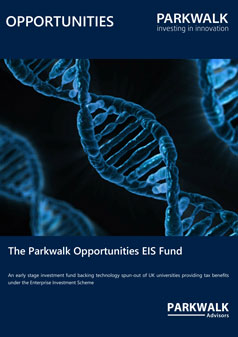|
We are delighted to announce that the Parkwalk Opportunities Fund has closed an investment in Creavo, Technologies, a spin-out.....
|
|
|||||
 |
|
|||||
|
Dear , Creavo was incorporated in 2014 to commercialise the team’s expertise in magnetic imaging technology. Whilst there are potentially a broad range of medical diagnostic uses the company has focused first on analysing patients who present with chest pains in A&E departments. The ability to measure the magnetic field of the heart has been around for over 50 years but it was not particularly useful due to the low signal to noise ratio. Then in 1970 came the development of superconducting quantum interference devices (SQUIDs), which were much more sensitive, when used in a magnetically shielded room, and could produce an image of the heart that was as clear as an electrocardiogram (ECG). A further breakthrough came in the late 1990s when unshielded SQUID devices were developed but these were still large, immovable and expensive to maintain so clinical applications have remained limited. Despite this there is now a large body of evidence that points to these devices being powerful tools for the diagnosis of cardiac abnormalities. One clear advantage that magnetocardiography has over ECGs is that the magnetic signal is not attenuated by tissue and so a picture of the whole organ can be acquired. The Technology Creavo’s differentiation is that it has developed new sensor technology and associated software that enabled the creation of a small, mobile device that does not require cryogenic cooling, but that delivers the same accuracy and efficacy as the older devices. The product, named Vitalscan, is easy to use, is mobile (it can be wheeled to the patient’s bedside), and in 3-5 minutes produces a trace, numerical data and a 2D visual magnetic field map of the heart. This output has a very high negative predictive value, i.e. it generates results which are strongly predictive of the absence of a major cardiac issue. This is a weakness of existing cardiac triage protocols. Thus it enables the healthcare professional to determine which patients do not need to go through the extensive, expensive and time consuming regime of biomarker tests and further diagnostic procedures to determine what the specific cardiac issue is with that patient. Creavo has IP assigned from the University of Leeds and is developing further IP in-house. The company already has a CE mark for the product in Europe and has filed for a 510(k) approval with the FDA in the US. The Market Opportunity The emergency cardiac market was chosen because the basic magnetic field technology is already used to analyse chest pains but with a machine that is expensive, immovable and large and because the current practice is to use diagnostic tests, utilising cardiac biomarkers, that take several hours and only determine who does require immediate treatment. Currently the NHS sees 1.3m patients a year in A&E presenting with chest pains and has no fast, reliable and affordable route to sort those that need immediate treatment (40%) from those that do not. As a consequence, treatment for the former group is sub-optimal and significant, unnecessary costs are incurred whilst testing the latter group. It is estimated that the NHS could save £200m a year by reducing unnecessary diagnostic testing and treatment on emergency patients and Creavo would hope to realise a significant portion of that as revenue. The problem is not limited to the UK but is common across healthcare systems globally so the worldwide market could be in the $bns. In the long term there are further opportunities to utilise this technology in other cardiac screenings and in other therapeutic areas. The Team Robert Barr, Chairman, is Vice Chairman and co-owner of Arran Isle Group, having previously been CEO there from 2004-2015. Prior to that, Robert was the COO of Kingspan Group plc. and previously, was MD (Europe) and a Director of the pharmaceutical drug delivery company, Bespak plc. Robert spent his early career in various international management roles at Diageo plc. Steve Parker, CEO, has held a series of senior roles over 35 years starting with roles in engineering, marketing and sales with Marquette Electronics and various national management roles at St Jude Medical inc. Most recently he was Senior Director, International Commercial Operations, at Abbott Laboratories with divisional commercial responsibility for all markets outside of North America. Professor Ben Varcoe, CSO, is a Professor in the Department of Physics and Astronomy at the University of Leeds and Chair of Experimental Quantum Information Science. He is a fellow of the Engineering and Physical Sciences Research Council. From 1997-2001 he worked at the Max Planck Institute for Quantum Optics where he led a team that saw the first unambiguous demonstration of photon quantisation. Ben is one of the leading UK experimentalists of precision measurements and has applied the principles of quantum metrology to several applications. John von Benecke, CFO, is Chief Financial Officer at Creavo Medical Technologies. His previous experience spans CFO roles at medical technology start-ups, including Veryan Medical, Cellnovo and ApaTech, and senior finance roles at blue chip healthcare companies like Abbott Laboratories. He has more than 15 years’ experience in healthcare and a decade working for start-ups, VC and PE backed-businesses. The Investment Case Creavo has made excellent progress to this juncture with an EU approved machine, early commercial traction and a strong management team and Advisory Board. It has begun a pivotal 750 patient study with Vitalscan machines in four of the UK’s largest emergency departments (Nottingham, Bristol, Leicester, Sheffield) and will carry out other studies in the next two years. It also has initial purchase commitments from several commercial partners and anticipates first commercial revenues this year. This funding round, backed by the University of Leeds, IP Group and Puhua Capital alongside Parkwalk, should allow the company to complete the clinical study, to complete the Mark II device, to scale and outsource manufacturing, to build its US operation and to add heft to their commercial operations in Europe. |
||
|
|||||
|
||
|
|||||

